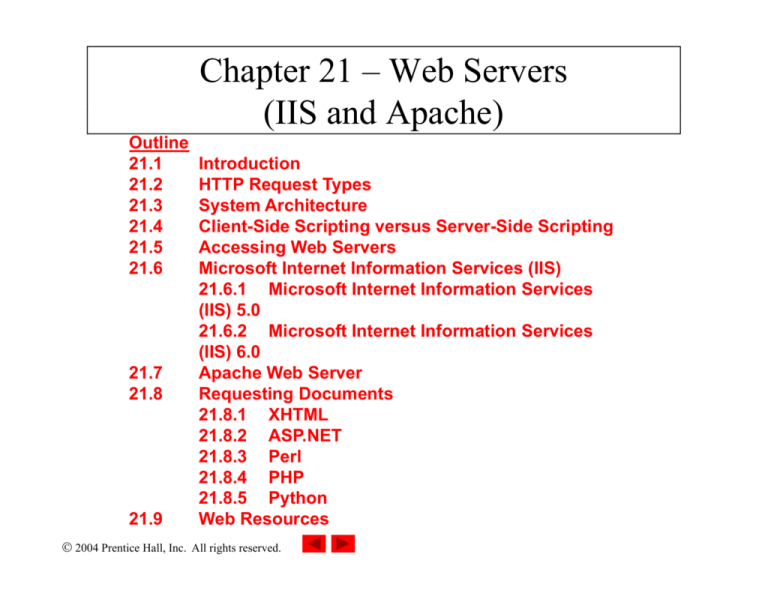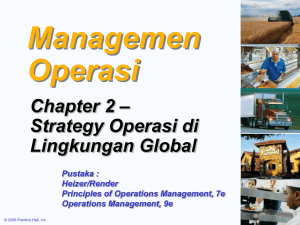
Chapter 21 – Web Servers
(IIS and Apache)
Outline
21.1
21 2
21.2
21.3
21.4
21.5
21.6
21.7
21.8
21.9
Introduction
HTTP Request Types
System Architecture
Client-Side Scripting versus Server-Side Scripting
Accessing Web Servers
Microsoft Internet Information Services (IIS)
21.6.1 Microsoft Internet Information Services
(IIS) 5.0
21 6 2 Microsoft Internet Information Services
21.6.2
(IIS) 6.0
Apache Web Server
Requesting Documents
21 8 1 XHTML
21.8.1
21.8.2 ASP.NET
21.8.3 Perl
21.8.4 PHP
21.8.5 Python
Web Resources
© 2004 Prentice Hall, Inc. All rights reserved.
Objectives
• In this lesson, you will learn:
– To understand a Web server
server’ss functionality
functionality.
– To introduce Microsoft Internet Information Services (IIS)
and Apache Web server.
– To learn how to request documents from a Web server.
© 2004 Prentice Hall, Inc. All rights reserved.
21.1 Introduction
• Web server
– Responds to client requests by providing resources
• URI (Uniform Resource Identifier)
• Web server and client communicate with
platform-independent Hypertext Transfer Protocol
(
(HTTP)
)
© 2004 Prentice Hall, Inc. All rights reserved.
21.1 Introduction
IIS 5.0
Microsoft
Corporation
5.0
2/17/00
Windows 2000,
Wi d
Windows
XP
Apache Web server
Company
Apache Software
Foundation
Version
2.0.47
Released
7/10/03
Platforms
Windows NT/2000/XP,
M OS X
Mac
X, Li
Linux and
d
other UNIX-based
platforms,
experimentally supports
Wi d
Windows
95/98
Brief
The most popular The newest release of Currently the most
description
Web server for
IIS from Microsoft.
popular Web server.
Windows 2000.
Included with
Freeware.
Price
Included with
Windows Server 2003
Windows 2000
and Windows
XP.
Fig. 21.1 Web servers discussed in this chapter.
© 2004 Prentice Hall, Inc. All rights reserved.
IIS 6.0
Microsoft
Corporation
6.0
3/28/03
Windows Server 2003
21.2 HTTP Request Types
• Request methods
–
–
–
–
get
post
Retrieve and send client form data to Web server
Post data to a server-side form handler
© 2004 Prentice Hall, Inc. All rights reserved.
21.3 System Architecture
• Multi-tier application (n-tier application)
– Information tier (data or bottom tier)
• Maintains data for the application
• Stores data in a relational database management system
(RDBMS)
– Middle tier
• Implements business logic and presentation logic
• Control interactions between application clients and
application data
– Client tier (top tier)
• Application’s user interface
• Users interact directly with the application through the client
tier
© 2004 Prentice Hall, Inc. All rights reserved.
21.4 Client-Side Scripting versus ServerSide Scripting
p g
• Client-side scripts
– Validate user input
• Reduce requests needed to be passed to server
• Access browser
• Enhance Web pages with DHTML, ActiveX controls, and
applets
• Server
Server-side
side scripts
–
–
–
–
Executed on server
Generate custom response for clients
Wide range of programmatic capabilities
Access to server-side software that extends server
functionality
© 2004 Prentice Hall, Inc. All rights reserved.
21.5 Accessing Web Servers
• Request documents from Web servers
– Host names
– Local Web servers
• Access through machine name or localhost
– Remote Web servers
• Access through machine name
– Domain name or Internet Protocol (IP) address
• Domain name server (DNS)
– Computer that maintains a database of host names and
their corresponding IP address
© 2004 Prentice Hall, Inc. All rights reserved.
21.6 Microsoft Internet Information Services
( )
(IIS)
• An enterprise-level Web server that is included
with Windows
© 2004 Prentice Hall, Inc. All rights reserved.
21.6.1 Microsoft Internet Information
Services ((IIS)) 5.0
• FTP Site
– Used for transferring large files across the Internet
• HTTP Site
– Used most frequently to request documents from Web
servers
• SMTP Virtual Server
– Sends and receives electronic mail
• Web Site Content Directory
– Directory containing the documents that clients will view
© 2004 Prentice Hall, Inc. All rights reserved.
21.6.1 Microsoft Internet Information
Services ((IIS)) 5.0
Fig. 21.3
Internet Information Services window of Internet Services Manager.
© 2004 Prentice Hall, Inc. All rights reserved.
21.6.1 Microsoft Internet Information
Services ((IIS)) 5.0
Fig. 21.4
Virtual Directory Creation Wizard welcome dialog.
© 2004 Prentice Hall, Inc. All rights reserved.
21.6.1 Microsoft Internet Information
Services ((IIS)) 5.0
Fi 21
Fig.
21.5
5
Vi t l Directory
Virtual
Di
t
Alias
Ali dialog
di l off the
th Virtual
Vi t l Directory
Di
t
Creation
C ti
Wizard.
Wi d
© 2004 Prentice Hall, Inc. All rights reserved.
21.6.1 Microsoft Internet Information
Services ((IIS)) 5.0
Fig. 21.6
Web Site Content Directory dialog of the Virtual Directory Creation Wizard.
© 2004 Prentice Hall, Inc. All rights reserved.
21.6.1 Microsoft Internet Information
Services ((IIS)) 5.0
Fig. 21.7
Access Permissions dialog of the Virtual Directory Creation Wizard.
© 2004 Prentice Hall, Inc. All rights reserved.
21.6.2 Microsoft Internet Information
Services ((IIS)) 6.0
Fig. 21.8
Internet Information (IIS) Services Manager window.
© 2004 Prentice Hall, Inc. All rights reserved.
21.6.2 Microsoft Internet Information
Services ((IIS)) 6.0
Fig. 21.9
Virtual Directory Creation Wizard welcome dialog.
© 2004 Prentice Hall, Inc. All rights reserved.
21.6.2 Microsoft Internet Information
Services ((IIS)) 6.0
Fig. 21.10
Virtual Directory Alias dialog of the Virtual Directory Creation Wizard.
© 2004 Prentice Hall, Inc. All rights reserved.
21.6.2 Microsoft Internet Information
Services ((IIS)) 6.0
Fig. 21.11
Web Site Content Directory dialog of the Virtual Directory Creation Wizard.
© 2004 Prentice Hall, Inc. All rights reserved.
21.6.2 Microsoft Internet Information
Services ((IIS)) 6.0
Fig. 21.12
Access Permissions dialog of the Virtual Directory Creation Wizard.
© 2004 Prentice Hall, Inc. All rights reserved.
21.7 Apache Web Server
•
•
•
•
•
Currently the most popular Web server
Stabilit
Stability
Efficiency
P t bilit
Portability
Open-source
© 2004 Prentice Hall, Inc. All rights reserved.
21.7 Apache Web Server
Fig. 21.13
Apache Web server starting. (Courtesy of The Apache Software Foundation.)
© 2004 Prentice Hall, Inc. All rights reserved.
21.8 Requesting Documents
• Requesting five different documents
–
–
–
–
–
XHTML
ASP.NET
Perl
PHP
Python
© 2004 Prentice Hall, Inc. All rights reserved.
21.8.1 XHTML
• Request XHTML documents from IIS 6.0 or
Apache
– Launch Internet Explorer
– Enter XHTML document’s location in Address field
© 2004 Prentice Hall, Inc. All rights reserved.
21.8.1 XHTML
Fig. 21.14
Requesting test.html from IIS 5.
Fig. 21.15
© 2004 Prentice Hall, Inc. All rights reserved.
Requesting test.html from IIS 6 or Apache.
21.8.2 ASP.NET
• Request ASP.NET document from IIS 5 or 6
– Launch Internet Explorer
– Enter ASP.NET document’s location in Address field
• Apache
p
support
pp ASP Classic but doesn’t support
pp
ASP.NET
© 2004 Prentice Hall, Inc. All rights reserved.
21.8.2 ASP.NET
Fig. 21.16
Requesting test.aspx from IIS 5.
Fig. 21.17
Requesting test.aspx from IIS 6.
© 2004 Prentice Hall, Inc. All rights reserved.
21.8.3 Perl
• Request Perl document from IIS 5 or 6
– Launch Internet Explorer
– Enter the Perl document’s location in the Address field
• Request
q
Perl document on Apache
p
Web server
– Put all Perl documents in cgi-bin directory
– Launch Internet Explorer
– Enter Perl document’s location in Address field
© 2004 Prentice Hall, Inc. All rights reserved.
21.8.3 Perl
Fig. 21.18
Requesting test.pl from IIS 5.
Fig 21
Fig.
21.19
19
Requesting test.pl
test pl from IIS 6
6.
© 2004 Prentice Hall, Inc. All rights reserved.
21.8.3 Perl
Fig. 21.20
© 2004 Prentice Hall, Inc. All rights reserved.
Requesting test.pl from Apache.
21.8.4 PHP
• Request PHP documents from IIS 5 and 6
– Launch Internet Explorer
– Enter PHP document’s location in the Address field
• Request
q
PHP documents from Apache
p
– Save PHP documents in the htdocs directory
– Launch Internet Explorer
– Enter PHP document’s location in Address field
© 2004 Prentice Hall, Inc. All rights reserved.
21.8.4 PHP
Fig. 21.21
Requesting test.php from IIS 5.
Fig. 21.22
Requesting test.php from IIS 6.
© 2004 Prentice Hall, Inc. All rights reserved.
21.8.4 PHP
Fig. 21.23
© 2004 Prentice Hall, Inc. All rights reserved.
Requesting test.php from Apache.
21.8.5 Python
• Request Python documents from IIS 5 and 6
– Launch Internet Explorer
– Enter Python document’s location in the Address field
• Request
q
Python
y
documents from Apache
p
Web
server
– Put Python documents in cgi-bin directory
– Launch Internet Explorer
– Enter Python document’s location in Address field
© 2004 Prentice Hall, Inc. All rights reserved.
21.8.5 Python
Fig. 21.24
Requesting test.py from IIS.
Fig. 21.25
Requesting test.py from IIS 6.
© 2004 Prentice Hall, Inc. All rights reserved.
21.8.5 Python
Fig. 21.26
© 2004 Prentice Hall, Inc. All rights reserved.
Requesting test.py from Apache.
21.9 Web Resources
•
•
•
•
•
•
•
•
•
www.microsoft.com/msdownload/ntoptionpack/askwiz.asp
www.w3.org/Protocols
www.apache.org
httpd.apache.org
httpd.apache.org/docs-2.0
www.apacheweek.com
linuxtoday.com/stories/18780.html
www.iisanswers.com
www.iisadministrator.com
© 2004 Prentice Hall, Inc. All rights reserved.

